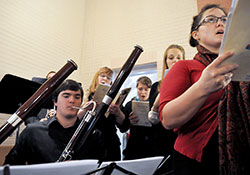Mozart’s Requiem sung during special All Souls Day Mass

Instrumentalists and vocalists play and sing Wolfgang Amadeus Mozart’s Requiem Mass in D minor during a Nov. 2 All Souls Day Mass at Our Lady of the Most Holy Rosary Church in Indianapolis. Owen Carlos, left, a music student at Butler University in Indianapolis, plays the bassoon, while Ann Lewis, Andrea Stanley, Noelle Brown and Alison Gudan, all Holy Rosary parishioners, sing. (Photo by Sean Gallagher)
By Sean Gallagher
The beautiful harmonies and evocative melodies of Wolfgang Amadeus Mozart’s Requiem Mass in D minor have thrilled classical music concertgoers for more than two centuries.
On Nov. 2, worshippers at Our Lady of the Most Holy Rosary Church in Indianapolis enjoyed Mozart’s Requiem while praying during a special All Souls Day Mass celebrated there.
Listen to it here:
Father Ryan McCarthy, Holy Rosary’s pastor, celebrated a solemn high traditional Latin Mass that day while being assisted by Fathers Christian Kappes and Jerry Byrd. This is the form of the Mass celebrated during and before the Second Vatican Council and was the kind of Mass celebrated in the days of Mozart.
Father McCarthy said that bringing together the beauty of Mozart’s Requiem with the beauty of the Church’s liturgy enhances both in a special Mass like the one that took place on All Souls Day.
“It engages all of the senses at once,” said Father McCarthy before the liturgy. “It moves us to a greater appreciation of beauty. And of course, beauty is considered a transcendental quality of God along with unity, truth and goodness. So, it should move us closer to God as we appreciate the beauty that God has given us in the world.”
He also said that the Mass celebrated with Mozart’s Requiem was a kind of “artistic evangelization” that he hoped would help worshippers at the Mass enter more deeply into the liturgy, and into the spiritual meaning of the feast day.
“My hope for the congregation is that their hearts and minds be lifted to God,” Father McCarthy said. “And particularly on an emotive level, this Mass helps people enter into that mystery of All Souls [Day], that mystery of Christ’s passion, death and resurrection as informing the way that we are going to face our own death and the way that Christ brings about our own salvation.”
Lindsay Wilcox, 27, is a member of St. John the Evangelist Parish in Indianapolis who attended the Nov. 2 Mass.
During a reception that followed, she shared how her parish’s new choir director had spoken to choir members about how the “Sanctus” (“Holy, Holy, Holy”) of the Mass allows worshippers to enter into the song that the angels sing eternally before God’s throne in heaven.
Wilcox said that this spiritual reality became tangible for her during the singing of the “Sanctus” in Mozart’s Requiem.
“As soon as they started, I could just see it. It was there,” she said. “Here were all the angels singing around us, and we’re just participating.”
Michael Carper, 22, is another St. John parishioner who attended the Mass.
“I had heard [the Requiem] on its own before,” he said, “but to be able to hear it in the proper context and to see the accompanying visuals and the actions that are happening at the altar was just so amazing.”
Luke Reese, Holy Rosary’s music director, hoped that this would be the experience of those attending the Mass.
“The mysteries, in a sense, become more understandable, if that’s possible, because you’re dealing with it on more than just a mental level,” he said. “You can feel it in your inner being.”
Nearly all of the more than 20 vocalists singing the Requiem were Holy Rosary parishioners. Some of the 12 instrumentalists were also parishioners, although most were music students at Butler University in Indianapolis.
“I think it’s a testimony to the dedication of people and the love of people for Christ,” said Reese of the contribution of Holy Rosary’s parishioners to the Requiem. “It’s a big sacrifice that people make of time and energy to be a member of a choir.”
Father McCarthy hopes in the future to celebrate similar liturgies with orchestral settings of the Mass. But he said that they will take place on special feast days that are not holy days of obligation since he recognizes that this kind of music will not appeal to all Catholics.
“You’re not making people feel like they’re being hijacked,” Father McCarthy said. “And yet, [All Souls Day and other feasts] are wonderful and great feast days on which many people do choose to go to Mass. Therefore, everyone there is there because they want to be moved toward greater worship of God through the holy sacrifice of the Mass and this music that complements it.” †
